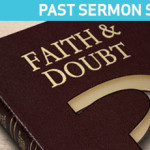We run our website the way we wished the whole internet worked: we provide high quality original content with no ads. We are funded solely by your direct support. Please consider supporting this project.
Justice and Biblical Clarity in Hindsight
Rachel Held Evans posted a challenging look at our history of using the Bible to uphold things like slavery and to condemn people like Galileo for his scientific findings. You really need to check out the specific quotes she cites to experience the full horror of the ways the Bible was used to justify some pretty horrible things. It’s easy for us to see from our vantage point the mistakes and prejudices of these people, but it may be that we have our own blind spots in how we view Scripture. Hindsight is 20/20.
From Rachel’s post:
It’s easy to look down our noses at the Christians who have come before us and discount them as unenlightened and uninformed. But to accept Galileo’s thesis, our 17th century forbearers would have had to reject 1600 years of traditional Christian interpretations of passages like Psalm 93:1, Ecclesiastes 1:5, and Joshua 10:12-14. And to accept the arguments of the abolitionist, our great-great-grandparents had to see beyond the “plain meaning” of proof texts like Ephesians 6:1-5, Colossians 3:18-25; 4:1, and I Timothy 6:1-2 and instead be compelled by the general sweep of Scripture toward justice and freedom . (I wrote more about this in my post, “Is abolition biblical?”)
We like to characterize the people in the quotes above as having used Scripture to their own advantage. But I find it both frightening and humbling to note that, often, the way we make the distinction between those who loved Scripture and those who used Scripture is hindsight.
Category: General
Tags: Bible, Hermeneutics, Justice, Scripture
Related Reading

Women, Leadership, & the Bible
Neither reason nor experience supports the notion that women cannot be gifted to exercise the highest levels of spiritual authority. There is simply no rationally discernable connection between a person’s gender and their natural ability to preach, teach, or lead others. Indeed, the experience of the last 150 years has indisputably demonstrated that women can…

How Should We Do Theology?
Delirious? via Compfight In yesterday’s post, we introduced a way of talking about theology with the use of concentric circles. At the center, is the revelational of Jesus—most keenly revealed on the cross. The next circle is dogma, which includes the central tenants of the historic-orthodox church. The next is what is called “doctrine.” And…

Why Bart Ehrman Doesn’t Have to Ruin Your Christmas (Or Your Faith) Part 4
This is the fourth of several videos Greg put together to refute Bart Ehrman’s claims published in the article What Do We Really Know About Jesus? We hope you’re enjoying these! They really provide a great overall approach to Biblical Criticism. If you missed the first three installments you can find them here, here and here.

How The Imperfections of Scripture Reveal God Perfectly
In my previous blog I discussed one important implication of a cruciform (“cross-centered”) approach to biblical inspiration. On the cross, I noted, God revealed his perfection by identifying with human imperfection. Jesus in some sense became our sin and our curse. In this light, I argued, why should anyone find it surprising, let alone disturbing,…

The Problem with Christocentrism
As we’ve discussed in the previous posts, there has been a growing move toward a Christocentric orientation in theology since Barth, and especially over the last fifty years. I enthusiastically applaud this trend, for I’m persuaded it reflects the orientation of the NT itself, so far as it goes. The trouble is, it seems to…

Past Sermon Series: Faith & Doubt
Faith is sometimes understood as the lack of doubt. As a result, doubt can be seen as the enemy of faith. But Biblical faith can withstand doubt and even be strengthened by it. God wants His people to wrestle with Him on the things that matter in their lives. We must not be afraid of struggling with deep…

